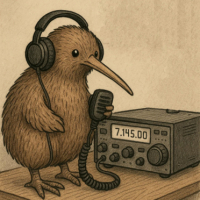jks
About
- Username
- jks
- Joined
- Visits
- 36,725
- Last Active
- Roles
- Member, Administrator, Moderator
- Points
- 670
Reactions
-
v1.820
From the CHANGE_LOG file:
v1.820 August 18, 2025
TDoA extension: (thanks UDXF forum)
Fixed problem with sampling hosts not consistently appearing on result maps.
Added new checkbox: Show "TDoA map with hosts". This causes the "... with hosts" result map
to always be shown at the end of a run rather than the default "... no hosts".
Connections to URLs of the form "kiwisdr.local:8073" work again. (thanks nitroengine)
-
Inactivity timer and password prompts while using kiwisdr.local address [fixed in v1.820]
-
Direct access to S Meter and Spectrum data
Well, now hold on. You should have mentioned your exact application at the beginning.
Something the Kiwi does do is allow precise GPS timestamping of the audio stream. This is how the TDoA direction finding application is able to work. Now post-processing the audio, extracting the timestamps and synchronizing the audio samples from geographically dispersed Kiwi is not a trivial task. But it is essentially what TDoA does.
So if your goal is to measure time-of-flight of LF/VLF static crashes (a la Blitzortung.org) then there might be some hope. But it will take some moderately complex programming.
-
v1.816 breaks all browsers except Firefox, LibreWolf et al [update: fixed in v1.817,818]
Bug found. My fault (always is). But I'm not going to be updating Mongoose 5 => 7 for a while. Due to the @bwilson issue and possibly others. Too much else of higher importance going on right now..
-
v1.817
From the CHANGE_LOG file:
v1.816,817 August 7, 2025
Better indication of when a channel is initially occupied. (thanks AC8FL)
The list of connections displayed on the control panel "User" tab and admin "Status" tab
is updated every 3 seconds. But a "bot" connection that isn't following the Kiwi API rules
takes about 10 seconds to be correctly identified and kicked. This has the side-effect of
making a channel look available when in fact it is occupied for those 10 seconds
(because the connection list entry is still blank). If this happens to the last channel
available you might incorrectly get the impression the channel isn't being “released"
because it looks unoccupied, but you can't connect to it (all channels are seen as full).
To make this situation more clear a user name of "(connecting)" will be shown immediately
when a channel is first allocated and updated when the connection is fully established.
This will also make it somewhat easier to spot when there are lots of bot connection
attempts rather than having to spot them by reviewing the log.
Admin webpage tab:
New button "Display all fonts in bold" which some of us need, lol. (thanks Jerry and KFS)
Does not apply to the admin page currently. This change required minor adjustments to
the user interface nearly everywhere to account for the larger size of the bold fonts.
If you see a spot where things look wrong please let us know.





